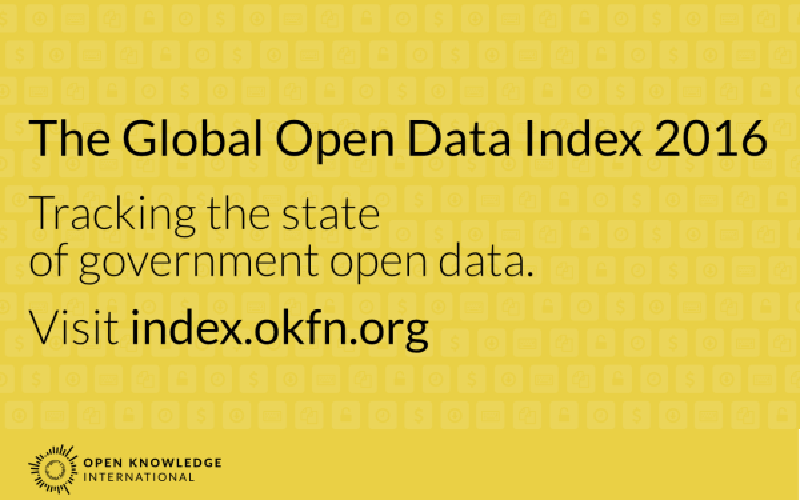Blog
Nepal’s Progress in Open Data: Ranking and Open Percentage
Nikesh Balami
|Thu Oct 05 2017
In May 2nd, 2017 Open Knowledge International launched the 4th edition of Global Open Data Index (GODI), a global assessment of open government data publication. This year Global Open Data Index compares national government in 94 places across the 15 key datasets that have been assessed by the community as the most useful for solving social challenges. It’s a crowdsourced open survey run and contributed by the communities and individual living all around the world.
Nepal has been the part of this global assessment continuously for the four years with lots of ups and downs. Open Knowledge Nepal a non-profit and official Chapter of Open Knowledge International has been leading it since the very beginning.
Open Knowledge Nepal believes the Index is an easy tool to gather data availability from government publishers. It can also encourage government publishers to improve their data standards. This will help in assessing the baseline of availability and nature of open data in Nepal and will enable to perform gap analysis and plan actions to make maximum impact with a minimum of effort.
When the Global Open Data Index was launched in 2013, Nepal debuted nationally at rank 52, with a score of 30 % open government data. In 2014, Nepal’s rank came down to 63, despite being 34 % open. With lots of Open Data momentum and initiative happening, Nepal shows a bit progress in 2015 Index and was ranked 61 with a score of 30 % openness.
But the result and ranking of 2016 Global Open Data Index (GODI) disappoint many open data civil society and activist working in Nepal. The index highlighted that the progress made by Nepal is very much slow in compared to other countries and the open data initiative started by Government of Nepal didn’t match the Global Open Data Standards, which hampered both ranking and openness percentage of Nepal at 2016 Index. With 20% of openness, Nepal was ranked 69 in 2016 Global Open Data Index.
The scores are evidences that Nepal has not made significant improvements over these four years. Technical issues like machine readability and open licensing (or lack thereof) continues to peg our score back. To improve our score significantly, we should consider these issues along with releasing more government data in the public domain.

Five findings from 2016 Global Open Data Index
- GODI highlights data gaps: Open data is the final stage of an information production chain, where governments measure and collect data, process and share data internally, and publish this data openly. While being designed to measure open data, the Index also highlights gaps in this production chain. Does a government collect data at all? Why is data not collected? Some governments lack the infrastructure and resources to modernise their information systems; other countries do not have information systems in place at all.
- Data findability is a major challenge: We have data portals and registries, but government agencies under one national government still publish data in different ways and different locations. Moreover, they have different protocols for license and formats. This has a hazardous impact — we may not find open data, even if it is out there, and therefore can’t use it. Data findability is a prerequisite for open data to fulfill its potential and currently most data is very hard to find.
- A lot of ‘data’ IS online, but the ways in which it is presented are limiting their openness: Governments publish data in many forms, not only as tabular datasets but also visualisations, maps, graphs and texts. While this is a good effort to make data relatable, it sometimes makes the data very hard or even impossible for reuse. It is crucial for governments to revise how they produce and provide data that is in good quality for reuse in its raw form. For that, we need to be aware what is best raw data required which varies from data category to category.
- Open licensing is a problem, and we cannot assess public domain status: Each year we find ourselves more confused about open data licences. On the one hand, more governments implement their unique open data license versions. Some of them are compliant with the Open Definition, but most are not officially acknowledged. On the other hand, some governments do not provide open licenses, but terms of use, that may leave users in the dark about the actual possibilities to reuse data. There is a need to draw more attention to data licenses and make sure data producers understand how to license data better.
- GODI is a platform to spark debate about open data: Ultimately, the Index is only relevant and actionable if it resonates with civil society and government. Thus, the Index seeks to enable meaningful dialogue about government data publication. Which regulations and laws prevent data from being published? Which government procedures block open data release? Why does individual data matter for different publics? And how to align the priorities of the public with those of government? More than being a poor ranking, the Index is a unique platform for citizens and governments to get into dialogue with one another.